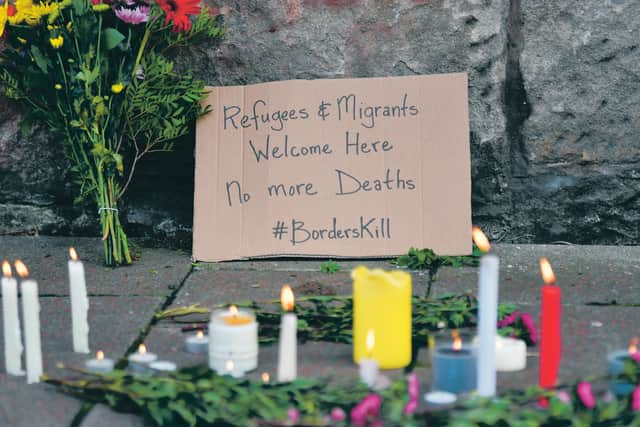Dani Garavelli: Distortion of Mercy’s plight is good reason for reflection


But it also provoked more problematic soul-searching about the way we respond to stories like Mercy’s; how we like our tragedies to fit a certain template; and whether – inadvertently – those of us who abhor the government’s hostile environment policies are sometimes reductive in our opposition.
Like the death of Alun Kurdi – the refugee whose tiny body was washed up on a Turkish beach five years ago – Mercy’s plight touched the rawest of nerves, provoking public outrage. And why wouldn’t it?
Advertisement
Hide AdAdvertisement
Hide AdMercy – we were told – died in destitution with a starving baby by her side. Her leave to remain having expired, she was forced to give up her job at the city’s Calabash restaurant, and had been surviving on hand-outs from friends and charitable organisations.


What a dreadful indictment of the UK government which cares so little for the fate of migrants it spent last week trying to deport 23 desperate souls who had risked their lives to cross the Channel in tiny, packed boats.
A crowdfunder was set up, and, within days, raised tens of thousands of pounds to cover the cost of Mercy’s funeral and provide for her child – evidence that many ordinary people care so much, they will give and give and give, even when that giving is, frankly, too knee-jerk and too late. But a display of generosity is a means of expressing horror, regret and vicarious shame, and no-one should be criticised for that.
All the same, the treatment of Mercy – by charities and journalists (including me) – gradually began to make me uncomfortable. It felt as if there was – amongst those of us who hope for, push for change – a temptation to hijack this 34-year-old’s fate to our own agenda; to weaponise it against the forces of xenophobia and hate.
We all know some stories – some people – are more likely to attract public sympathy than others. And Mercy had it all – the youth, the vitality, the baby. While male asylum seekers are often stigmatised as “at it”, this is less true of young mothers fending for their children.
And opposing the current system is a priority. It’s a system designed to strip people of dignity. A system that forces those who have fled persecution to tell their stories over and over again. A system that denies asylum seekers the right to contribute to society, then treats them as pariahs.
Mercy is not the first migrant – even in Glasgow – to find herself “overwhelmed” by privations which have been exacerbated by lockdown. In May, Adnan Elbi, from Syria, was found dead in one of the city centre hostels into which hundreds of asylum seekers were decanted at the start of the pandemic. He is understood to have been suffering from depression.
In June, Badreddin Abadlla Adam, from Sudan, who had been suffering from mental health problems, stabbed six people before being fatally shot by the police.
Advertisement
Hide AdAdvertisement
Hide AdOn one level, it is natural that this latest tragedy to befall the city should be seized upon as “the inevitable consequence” of the Home Office’s approach to immigration and, in particular, its No Recourse to Public Funds policy.
But Mercy was more than just a symbol of the barbarity of the state. Like all of us, she had strengths and flaws and baggage. As the week wore on, some of those around her began to rebel against the way her story was being plated up and served to a public predisposed to consume it.
For a start, there is no real evidence her death was linked to destitution; it seems more likely underlying kidney problems were to blame. Nor – according to those who knew her – was her son malnourished beyond not having eaten in the 24 hours before her body was discovered.
Further investigation revealed she wasn’t born into poverty either. Her father, who still lives in Uganda, is a former MP and she attended an upmarket school, though work in her home country appears to have been hard to come by. While she had been struggling financially in Scotland since losing her leave to remain, she had close friends and was not isolated.
In a beautiful Guardian tribute, one of those friends described her as a “rainbow” – a “vibrant spirit” who wore brightly coloured lipstick, worked hard when she was allowed to, and was devoted to her baby. It carried a photograph of her taken in the Briggait – the old fish market turned cultural centre – holding him high, gazing adoringly into his face, her hair in a long pony-tail dangling behind her.
In the Daily Mail, other “friends” offered other perspectives. Mercy, one of 14 siblings, and from a “high-achieving family”, had suffered from alcohol addiction and depression for many years, they said. Her vibrant smile hid an inner sadness. “It is wrong for British politicians and media to say she was penniless,” her brother Eric told the newspaper. “If she had needed anything, she could have just asked.”
Perhaps these versions are not competing, but the same story told in different ways. Mercy might have been all these things: loving, devoted, troubled, vivacious, and alcohol dependent. She is no longer here to give an account of herself; all we have is these little dots of light refracted through those who knew her, like a rainbow.
What is the point of all this? Just that it serves as a reminder that most of our lives are messy, full of conflicts and contradictions; that they do not fit some pat narrative of survival or victimhood. No-one should ever be defined by their death, and Mercy’s was devastating whatever the circumstances.
Advertisement
Hide AdAdvertisement
Hide AdOf course, those of us who regard the asylum system as iniquitous must keep on lobbying for change. Under Priti Patel, already dehumanising rhetoric is being ramped up to ever more toxic levels; we must not let that go unchallenged. Here in Scotland, poverty and mental health problems appear to be increasing. The right to work would bring not only more financial stability, but also structure, self-respect and a connection with the community.
With immigration a reserved issue, First Minister Nicola Sturgeon’s hands are tied, but she too must be pushed to find ways around the hostile environment policies; to use what powers she has to mitigate against the UK government’s worst excesses.
Still, I hope Mercy’s “story” – and the way it has been co-opted – will make all of us reflect on how we think about and cover such sad events. If we co-opt the lives of asylum seekers to a “cause”, even if that cause is a good one, aren’t we also guilty of “othering” them, of denying them agency, of reducing them to a single facet of their lives, such as poverty or debt, and of failing to acknowledge the complexity of human existence?
Comments
Want to join the conversation? Please or to comment on this article.